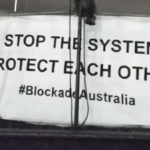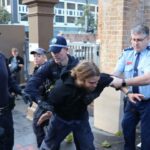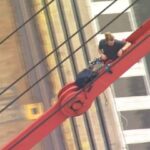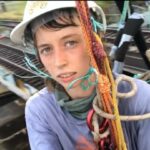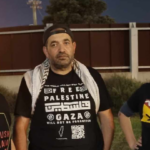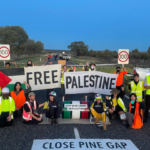Blockade Australia Has Shut Down Newcastle Coal Line for 10 Days Straight: Interview With Grace
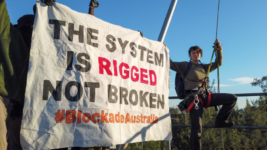
Blockade Australia is back with a vengeance, as the network of climate defenders have been busily undertaking a sustained action against the resource rail line leading from the interior out to Newcastle Coal Port: the planet’s largest such port.
But why hit the Newcastle coal rail transport line again, as Blockade has done in the past?
Well, according to Grace, who’s action was conducted on the fifth day of play, marking the ninth such individual direct action, the resources that travel along that train line lead to one percent of global emissions.
And as is the tendency of climate defenders, when hanging around waiting for law enforcement intervention, Grace livestreamed her experience on the end of the rope and pointed out that if a train continued down the track, it would break the line and she’d plummet to her death.
At which point, a viewer may be struck by the determination of this 24-year-old university student, who was not only risking her life but also her liberty in order to raise the alarm about the unfolding crisis, especially those few deniers left amongst who may stop and consider why this might be.
End of days
Wednesday, 3 July, marked the 10th day of the sustained action against the fossil fuel industry in the Newcastle region. At least 18 climate defenders have been arrested and charged by NSW police, and the climate defence network that’s notorious for making its point well known is at it again.
The sustained action has disrupted multiple coal trains, and Transport for NSW has complained that 200-odd passenger trains have also been delayed.
Yet, the flipside of this, to simply forget about the crisis and make it to work on time, is to ignore the tens of thousands of people already dying from extreme heat annually.
The heatwaves stubbornly hanging over the northern hemisphere this year have been the worst ever. Over 1,300 pilgrims died during the annual Hajj in Mecca. And New Delhi peaked at 52 degrees Celsius at the end of May.
And for those in the Global South suffering this extreme heat, they’re well aware it’s only going to escalate.
NSW premier Chris Minns said he was quite fearful that one of the climate defenders could lose their lives in the current action, as a couple of more people were dying of heat exhaustion in Africa, and he added that NSW police were enforcing the law to ensure business as usual keeps killing them.
Blockade is back
Blockade Australia has been a little quiet over the last year or so. But that’s been due to one of the most heavy-handed operations ever carried out by NSW police, which occurred in mid-2022, when it attempted to stamp out the network due to a planned week of direct actions targeting Sydney.
NSW police were caught staking out a property, which then led to a raid. Climate defenders were visited at their homes, stopped in their cars and arrested at bus stops. And then the police loaded them up with extreme bail conditions in order to paralyse the entire network of climate defenders.
Sydney Criminal Lawyers spoke to Grace about the fact that gone are the days when people were talking about a “coming crisis”, as it’s already here, why she chose to put her liberty on the line and how she’s realised that her liberties are actually reliant upon the denial of others’ freedoms.
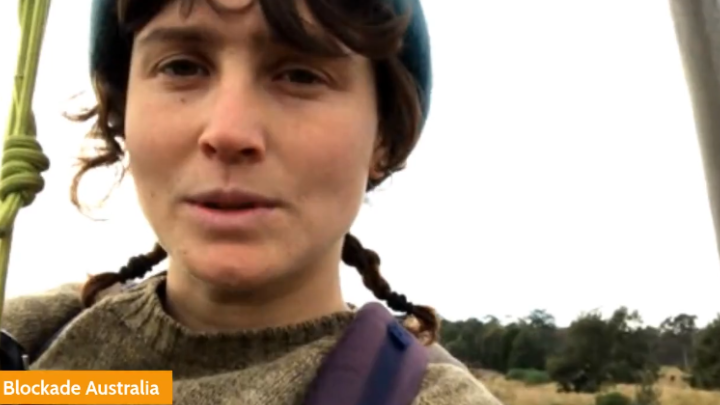
Grace, Blockade Australia was causing such a ruckus back in 2022 that the climate defence network became the subject of an extremely heavy-handed NSW police operation that successfully strategically incapacitated it for quite some time.
However, now, the climate defence network is back to its old tricks. So, how would you describe what Blockade Australia is up to right now in regard to the Newcastle Coal Port rail line? And how effective has it been so far?
As we speak, we are at day 10 of the Blockade Australia actions that are stopping the movement of goods along the rail line that leads to the Newcastle Coal Port. I was arrested on day 5.
This is a sustained action. So, it’s not only stopping the goods moving at the time of the direct action, but it also compounds the effect and eventually affects work back at the mine itself.
And these sustained actions can’t be ignored. My charge sheet states that ongoing actions of BA have cost one company over $60 million.
So, sustained actions create the political leverage that we need to actually create real change.
So, the sustained action along the rail line to Newcastle Port is causing companies financial harms?
Yes. But that’s not the goal of the actions. It’s not about creating economic damage but it’s about stopping the system, as a whole.
It’s about putting a block in the extractive system over a period of time in order to create that political leverage.
So, in taking these actions, it is a way that individuals can influence the system. And it’s not just Blockade Australia, as other organisations are involved as well. Rising Tide blocked the Newcastle Coal Port rail line last year.
We’ve seen people coming up and taking that action multiple times. And with this action we’ve seen 18 people arrested so far. And more and more people are becoming involved, so it’s not as if the pressure will stop.
In the footage you took when you were suspended in the air beside the rail line from a tripod positioned on unceded Wonnarua Country, you point out that if the train did pass through, you’d fall and perhaps lose your life.
But you didn’t just risk your life, you’ve risked your liberty as well. Indeed, NSW police has slapped you with five serious charges: unlawful entry on inclosed lands, trespass risking the safety of a person, interfering with a train, stopping a train and obstructing a railway.
So, why are you doing this at the age of 24, when perhaps there are other things, one could be doing?
I’ve been having discussions recently about this issue, and someone said something to me that stuck. They said that societal collapse is coming, and we can either just let it happen how it will, or we can try to have some sort of influence upon how it breaks down.
I’m coming from that position of seeing these systems collapsing already and trying to stop the behaviours that are harming us.
Another important point is you said that I’m risking my liberty. But an interesting aspect to that is in terms of what we see as liberty and what our personal liberty is based upon.
In regard to myself, I see that I am a rather affluent person living in so-called Australia, and my liberties are built upon the exploitation of others. They’ve been built upon slavery and colonisation.
So, I don’t want to be taking liberties that are at the cost of the freedoms of others.
Our collective liberty is entirely intertwined, and in the current system that we have, while some of us are enjoying the liberties of consumerism, that relies on others being exploited and having their land taken away.
And because of that, it feels hard not to actively engage with creating change.
Back around 2019, when Extinction Rebellion put climate back on the agenda, people were talking about the coming crisis.
By the end of that year, the Black summer of bushfires brought extreme weather to our front doors. Yet, people kept talking about the coming crisis.
But over the past few years, it no longer feels like the crisis is in the future, as extreme weather is occurring somewhere across the planet 24/7 all year long.
So, what’s your opinion on where we’re at with the crisis?
We’re definitely into the crisis. We are well into it. And ecologically, we’ve been seeing mass extinctions for decades now.
It has been gathering steam, and we’re well and truly into it.
Again, in a relatively affluent society, like Australia, people have been able to live with some distance from those direct impacts and have not been affected by the crisis.
But that’s now changing. Things like the cost of living are increasing.
There are more and more people feeling the effects of the climate crisis and the issue is climbing up the class ladder.
So, it is getting harder and harder for people to live amongst it and continue to ignore that this is happening.
Another aspect to it is that recently we’ve had the genocide in Palestine and exploitative conflicts happening, in Sudan and Congo, and that’s another indication that we are well into the crisis.
Most wars are over resources. And a lot of places, where there is intense human suffering at the hands of militarism, it is because those regions have resources or land, which we too often think of as a resource.
As long as we are not learning to live within our means, the crisis is going to get worse.
As mentioned before, Blockade Australia was hit with extreme police measures in mid-2022. There were raids, arrests, surveillance, imprisonment and overbearing bail conditions.
So, what has your personal experience been like in being arrested and taken into custody?
I consider that as I’m a white, relatively affluent, cisgendered woman, who is fairly obliging towards authority, I probably had one of the more courteous experiences of that system. But it was not pleasant by any means.
For anyone being in the watchhouse, or being held in custody, it’s a place that is meant to make you feel humiliated and degraded and at the mercy of other people. There is an immense power imbalance.
When the cops want to make small talk with you and just have a chat, it’s not actually how it appears on the surface because you’re under arrest and at their mercy.
My experience is not the experience of most people in the criminal justice system. Many going through the system are people of colour and Aboriginal people and their experience is worse because they are minorities.
I was also in a position of having chosen to take action that saw me there, whereas most people have not chosen to enter those spaces.
And lastly, Grace, parliamentarians have been arguing about what to do regarding climate for at least 20 years now, and nothing has really been achieved.
Albanese said he would end the climate wars on election. Peter Dutton is now spruiking going nuclear.
So, in your opinion, how is the Australian political class handling the climate crisis right now? And how is positive change going to come about considering this?
The handling of the climate crisis is absolutely pathetic, but it is also entirely to be expected.
What needs to be addressed is a change from this extractive system, and that goal is not in line with the structures of our political system.
I don’t think the change that we need to see happen can come from the political class. So, it makes sense that they’re beating around the bush and making all of these very light attempts at being seen to be doing something.
So, the system in place isn’t capable of producing the solution we need to the climate crisis?
No. I don’t think so. Our political system is so intertwined with our economic system and a mindset around viewing the earth as a resource for a certain group of people. It’s the earth and all other people that are considered as resources by this group.
And our political system is so deeply interlinked with endless economic growth, which isn’t possible on a finite planet.
We have limited of resources. And living within our means is not about economic growth. The school of thought around degrowth is probably closer to the solution.
The changes needed will be drastic for the countries that have been benefiting from the extractive system.
So, there are changes for us personally but also for us as a whole in the way we live and how we treat the earth.
And I don’t think the political class is able to make those changes.


